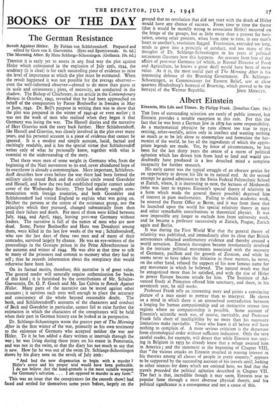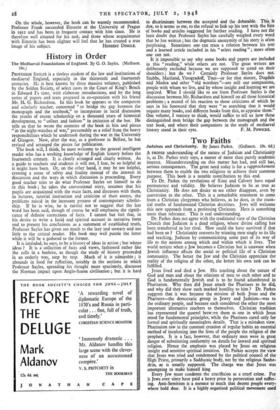Albert Einstein
Einstein, His Life and Times. By Philipp Frank. (Jonathan Cape. 16s.)
THE lives of outstanding scientists are rarely of public interest, but Einstein provides a notable exception to this rule. For this the fact that he was born a German Jew in 1879 has some responsibility. As a mathematical physicist he runs almost too true to type ; retiring, other-worldly, active only in intellect and wanting nothing so much as to be left alone to contemplate and formulate the har- monies of the world, he has all the ingredients of which the appro- priate legends are made. Yet, by force of circumstances, he has been for the last thirty years the centre of a storm of political agitation which has driven him from land to land and would un- doubtedly have produced in a less detached mind a complete incapacity for further research.
His early career was the typical struggle of an obscure genius for an opportunity to devote his life to its natural end. At the second attempt he gained admission to the Swiss Federal Polytechnic School at Zurich, where, it is interesting to note, the lectures of Minkowski (who was later to express Einstein's special theory of relativity in a form which made the general theory possible) deprived him of interest in pure mathematics. Failing to obtain academic work, he entered the Patent Office at Berne, and it was from there that he launched upon the world his special relativity theory in 1905 and other remarkable contributions to theoretical physics. It was now impossible any longer to exclude him from university work, and he became a professor successively at Zurich, Prague, Zurich again and Berlin.
It was during the First World War that the general theory of relativity was published, and immediately after its close that British astronomers obtained confirmatory evidence and thereby created a world sensation. Einstein thereupon became involuntarily involved in the intricate political movements associated with the recovery of Germany, pacifism and the growth of Zionism, and while he seems never to have taken the initiative in these matters, he never, on the other hand, refused the support of his now famous name for any movement in which he believed. The natural result was that he antagonised more than he satisfied, and with the rise of Hitler to power Europe became unsafe for him. The Institute of Ad- vanced Study at Princeton offered him sanctuary, and there, in his seventieth year, he still works.
Professor Frank tells an interesting story and paints a convincing picture of a man easier to portray than to interpret. He shows us a mind in which there is an unresolved contradiction between a longing for human companionship and an instinctive retreat into regions where no companionship is possible. Some account of Einstein's scientific work was, of course, inevitable, and Professor Frank falls short of intelligibility by no more than his necessary limitations make inevitable. Those who knew it all before will have nothing to complain of. A more serious criticism is the departure from chronological order without sufficient indication. Only the very careful reader, for example, will detect that while Einstein was stay- ing in Belgium in 1933 he already knew that a refuge awaited him in America ; and the statement at the beginning of Chapter VIII, that " the vicious attacks on Einstein resulted in rousing interest in his theories among all classes of people in every country," appears to be supported by the succeeding account of his travels until, looking to other sources for dates which are omitted here, we find that the travels preceded the political agitation described in Chapter VII. The fact is that, incredible though it may seem, Einstein rose to popular fame through a most abstruse physical theory, and his political significance is a consequence and not a cause of this. On the whole, however, the book can be warmly recommended. Professor Frank succeeded Einstein at the University of Prague in 1912 and has been in frequent contact with him since. He is therefore well situated for his task, and those whose acquaintance with Einstein has been slighter will feel that he has created a true







































 Previous page
Previous page